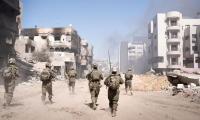LONDON: Leading western media practitioners have said that Indian Held Kashmir (IHK) issue doesn’t get due coverage in western press because various vested interests are at play, including India government’s intolerance of media that highlights Kashmir conflict.
Leading figures who have worked for influential western media outlets gathered in London for the International Media Conference held under the auspices of International Commission for Human Rights and South Asia Centre for Peace and Human Rights.
The opening session was chaired by Barrister A. Majid Tramboo who stressed the need upon the conference panelists and participants to highlight the elements that would bring the Kashmir issue, including the gross human rights atrocities being perpetrated there to huge limelight by the international media.
Chris Leslie MP, Chairman of All Parties Parliamentarians Group on Kashmir (APPG) in the British Parliament, said that the APPG on Kashmir has decided to visit Srinagar and Muzaffarabad in the upcoming spring. He stressed a unified focus by Kashmiri diaspora to highlight this left-behind legacy.
Prof Nazir A Shawl articulated the media to play a fair role in projecting the Kashmir conflict with specific reference to the ongoing human rights utter violations in the occupied territory of Jammu & Kashmir.
Victoria Schofield, author and journalist, said that vested interests play a role in media reporting; Kashmir may have become a complex issue but it is for the media to create narratives; one must go to the ground which is fundamental to the distribution of genuine information.
George Carey, documentary film-maker and a famous former BBC stalwart presenter, said that access to conflict areas is the biggest problem and that makes it harder to verify citizen journalism; sharing his experience he believes that it is “bits and pieces” in conflict zones that makes news and that is what local media should explore.
Robert Gallimore, researcher and journalist, emphasised three factors in media reporting; (i) there has to be a clear villain and injustice, (ii) there is need for a tangible solution which should be clearly articulated (iii) a simple and perpetual narrative.
Dr Alfred De Zayas, United Nations Independent Expert on the Promotion of Democratic and Equitable International Order, articulated that democracy is an expression of self-determination and that the media must report thoroughly and responsibly. “It should not focus exclusively on politically correct or fashionable issues but must also address neglected topics such as Kashmir and others.”
Lord Duncan emphasised that the media, as a matter of course, should report human rights violations wherever they occur. Tahir Aziz (South Asia Programme Director, Conciliation Resources) highlighted that it is paramount for Kashmiri people to demonstrate conciliatory approaches to get stakeholders involved in building peace and resolution and this will get the media attention as simply media reporting is not enough to get the problem solved as it is evident from other heavily reported conflicts. Kelvin Hopkins MP re-iterated his support to the Kashmir cause and stated that the media may not interfere in political decision-making but it can objectively shape the desired direction towards resolution of the conflict and as Kashmiris struggle is for democracy they deserve media support.
Martin Weightman pointed out that religious leaders in conflict areas should separate themselves from political positions as it is often seen that religion is used as justification for political goals. He emphasised that journalists’ vital role is to focus on conflicts and report on them impartially and independently. Francoise Tihon, a journalist from Brusells, said that media exposure in conflict areas is directly linked with situations as they develop in those places.
Gavin Shuker MP stated that the will of the people needs to be ascertained to move forward and that the media can be a great resource to promote people’s aspiration in an objective manner. He stressed that the way forward to resolve the Kashmir conflict is through people’s will and this is what the media ought to stress.
Ianina Cozari, Brussels based Russian journalist, Alaa Bayoumi, news editor Al Jazeera, Sabia Akram Hussain, Deputy Leader and Cabinet Member of Social and Health Care of Slough Council, Betty Cleeren, Ranjit Singh Sarai, Leon Kaulahau Siu, BBC’s Sajid Iqbal, Abdel Wahab Hani of United Nations Committee Against Torture and Rita Payne (President of the Commonwealth Journalists Association) addressed last session of the conference.
University of Engineering and Technology Peshawar seen in this image. — Facebook/University of Engineering and...
In this photo, the Chief Minister of Khyber Pakhtunkhwa Ali Amin Gandapur addresses the provincial assembly on March...
Prisoners sitting inside a dark lockup are seen in this undated image. — AFP/FileCHARSADDA: The police claimed to...
This representational image shows a little plant. — Unsplash/FileMINGORA: A tree plantation drive was launched in...
Workers repair the high voltage wires on a pole on February 20, 2024. — Online KOHAT: The Federal Investigation...
Khyber Pakhtunkhwa, Jamaat-e-Islami provincial chief Prof Mohammad Ibrahim Khan addresses an event. —...







